| "Semimaru" is famous for its Hyakunin-Isshu. | |
| 蝉丸は百人一首で有名です。 | |
| Hyakunin-Isshu is a traditional Japanese cards. | |
| 百人一首は伝統的な日本のカルタです。 | |
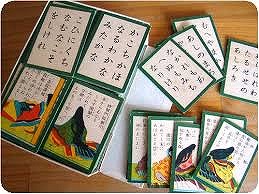 |
|
| Hyakunin means 100 persons, Isshu means 1 tanka (Japanese short poem). |
|
| 百人は100人の人々、一首は1つの短歌を意味します。 | |
| So that means, each of 100 poet (tanka writer) composed 1 tanka. |
|
| ということは、100人の歌人がそれぞれ1つずつ短歌を作ったということになります。 | |
compose 詩・文・曲などを作る、作曲する poet 歌人 |
|
| Playing Hyakunin-Isshu is difficult to little children because they are written in old Japanese. |
|
| 百人一首で遊ぶことは、古語(古い日本語)で書かれてあるため、小さな子供にとってはむずかしいです。 | |
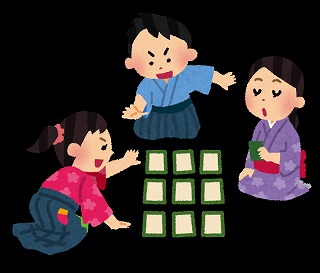 |
|
| But there's a easy play with Hyakunin-Isshu called Bozu-mekuri game. | |
| でも”坊主めくり”と言う百人一首を使った簡単な遊びがあります。 | |
| Ok, let me show you about the game. |
|
| さあ、そのゲームについて説明させて下さい。 | |
| First, sit in a circle, then put the 100 cards face down on the center. | |
| まず、丸くなって座り、真ん中に100枚の札を裏返しにして置きます。 | |
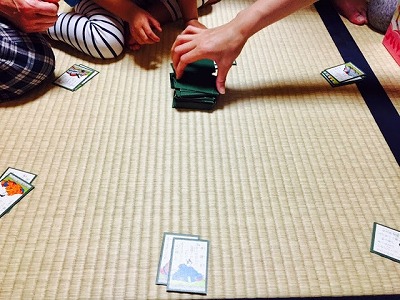 |
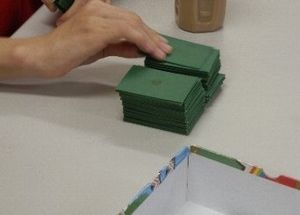 |
| Next pick a card in turn. | |
| 次に順番に札を取ります。 | |
| There are 4 kinds of cards, nobleman, noblewoman, emperer, monk. | |
| 4種類の札があります、男性の貴族、女性の貴族、天皇、坊主です。 | |
| If you pick a nobleman-card , you can get the card. | |
| もし、男性の貴族の札を取ると、そのカードがもらえます。 | |
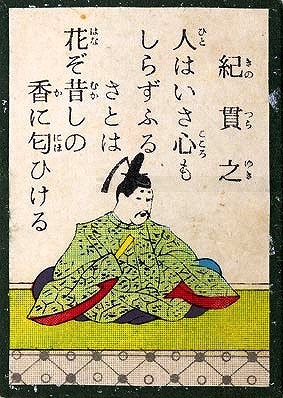 |
|
| If you pick a monk-card, you have to put the card and all your cards on the center. |
|
| もし、坊主の札を取ると、そのカードとあなたのカード全部を、真ん中に置かなければなりません。 | |
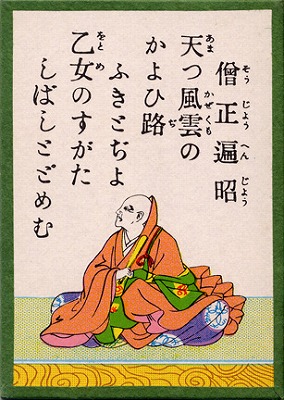 |
|
| If you pick a noblewoman-card, you can get the card and you can pick a card once more. |
|
| もし、女性の貴族の札を取ると、その札がもらえ、しかも、もう1枚、札を取ることが出来ます。 | |
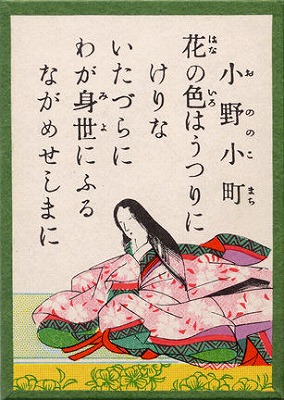 |
Japanese think that Onono komachi is one of the 3 best beautiful women in the world. 小野小町は世界3大美人のひとりだと日本人は 思っています。 But she is not famous in the world. でも彼女は世界では、有名ではありません。 |
| If you pick a emperor (Tennou)-card , you can get the card and all the cards on the center. |
|
| もし、天皇の札を取ると、その札がもらえ、しかも、真ん中にある札を全部もらえます。 | |
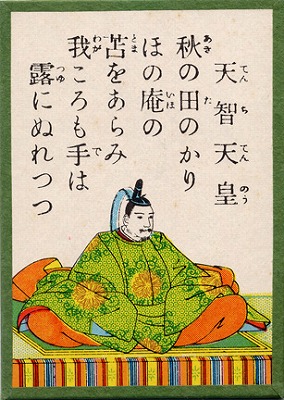 |
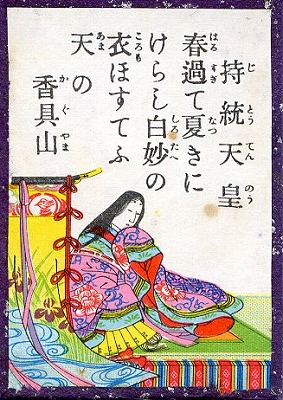 Female emperor 女性天皇 |
| Finally, the more, the winner. | |
| 最後に1番札のたくさんある人が勝ちです。 | |
| There are many monks in Hyakunin-Isshu, but only Semimaru wear a hood. | |
| 百人一首にはたくさんの坊主がいますが、蝉丸だけが頭巾をかぶっています。 | |
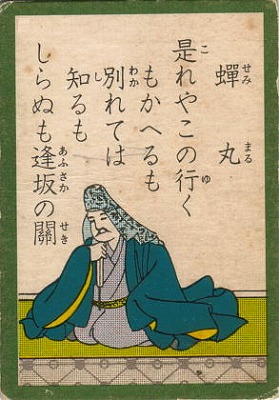 |
|
| So we thought Semimaru was the worst monk. | |
| それで私たちは蝉丸が一番悪い坊主だと思っていたんです。 | |
| That's not true, of course. | |
| もちろんそれは真実ではありません。 | |
| Someone pick a Semimaru-card, we used to jeer "You got Semimaru, Semimaru." |
|
| 誰かが蝉丸のカードを取ったら、私たちは「蝉丸取った、蝉丸取った」とはやしたものでした。 | |
jeer(ジアー) はやす |
|
| Semimaru was a poet and blind Biwa player in Heian-period. | |
| 蝉丸は平安時代の歌人であり、琵琶の弾き手でした。 | |
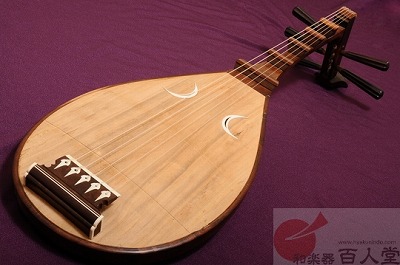 |
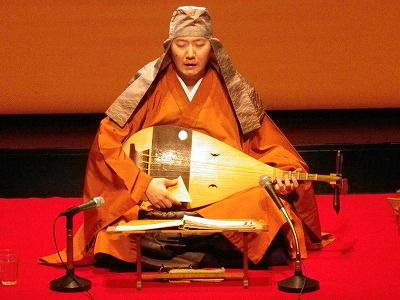 |
| You know, he composed a famous tanka "Koreyakono〜(5)yukumokaerumo(7)
wakaretutu〜(5) shirumoshiranumo(7) ousakanoseki〜(7)" |
|
| ご存知の様に、彼は有名な短歌の 「これやこの〜、行くも帰るも分かれつつ〜知るも知らぬも逢阪の坂〜」を作りました。 |
|
| 20 years ago, I found Semimaru's grave by chance on the old guide book in Fukui. |
|
| 20年前、私は偶然、福井の古いガイドブックで蝉丸の墓を見つけました。 | |
| It was written by the very small letters. | |
| それはとても小さな文字で書かれていました。 | |
| At that time I'd like to visit there. | |
| その時、私はそこに行きたくなりました。 | |
| But how to get there was difficult because the grave was minor place. | |
| でも蝉丸の墓はマイナーな場所なので、そこを訪ねることはむずかしかったんです。 | |
| There was not imformation on line, of course. | |
| もちろんインターネット情報はありませんでした。 | |
| We asked a policeman about it in the small police box, but he didn't know it. | |
| 私達は小さな交番のお巡りさんにそこについて尋ねましたが、知りませんでした。 | |
 |
|
| So he called Fukui-Prefecture police office and wrote us how to get there. | |
| それで彼は福井県警に電話してくれ、行き方を書いてくれました。 | |
there は方向なので、getのあとにtoはいらないので注意 |
|
| The grave was located around lot's of low mountains. | |
| その墓は多くの山々に囲まれていました。 | |
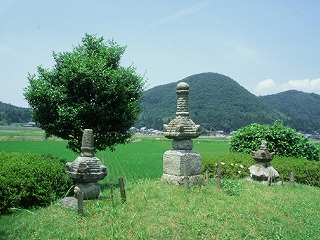 |
|
| I imagined, he played Biwa there, his beautiful Biwa sounds rang in the quiet village and mountains. |
|
| 彼がそこで琵琶を奏で、その美しい琵琶の音色は、静かな村と山々に鳴り響いたんだなと私は想像しました。 | |
| I timeslipped to the Heian-period (794〜1192). | |
| 私は平安時代(794年〜1192年)にタイムスリップしました。 | |
| That is my impressive place to me. | |
| そこは私にとっての印象的な場所です。 | |
 |
|
| 2015年9月24日(木) | トップページへ戻る |